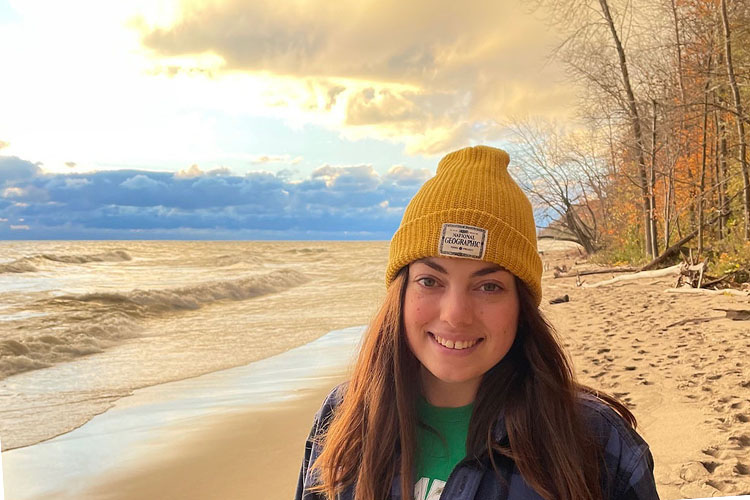
Katie Schulz started her career in marketing, but soon turned to science and returned to her roots in Milwaukee and Lake Michigan. (Photo courtesy of Katie Schulz)
What’s one of the most rewarding parts about working in water science? You can make a difference in a multitude of ways.
“One of the reasons I wanted to go into science is that I wanted to have a positive impact on the world,” said Katie Schulz, who earned her master’s degree from UWM’s School of Freshwater Sciences in May 2021. “There are so many paths in the water industry. Some people are raising fish, some are looking at nanoparticles or nutrient food chains.”
Some, like Schulz, are ensuring people have safe drinking water. She was hired by the Wisconsin Department of Natural Resources in September as an environmental program associate in the Drinking Water and Groundwater Program.
The hands-on research experience that Schulz gained through Freshwater’s master’s degree program and her post-graduation internship with the City of Racine made her an ideal candidate for the job at the DNR.
“Katie was an incredible candidate who quickly stood out in a deep and highly competitive candidate pool. Her experience at the UWM School of Freshwater Science gave her the perfect platform to develop her skills as a scientist, researcher, writer and communicator,” said Jesse Jensen, southeast region field supervisor at the DNR.
Returning to her roots
Although Schulz majored in biology at New York University in New York City, she worked at a startup media company during college and then landed a job at a marketing agency. When she realized a career in science was a better fit, she returned to her Milwaukee roots.
“Water was the perfect branch of science for me because I’d grown up around water. I’ve always lived on a coast,” she said. “The School of Freshwater Sciences was the only school I applied to.”
Her thesis work in Professor Rebecca Klaper’s lab revolved around contaminants, specifically per-and polyfluoroalkyl substances (PFAS), which are considered “forever chemicals” because they don’t break down and they can move through soil and contaminate water sources. People who live near contamination sites often suffer from adverse health effects.
Schulz put together reports that looked at industrial uses for PFAS, potential contamination hotspots and the types of technologies available for removal. She also studied biosolids, which are products of the wastewater treatment process that when treated properly can improve the health of agriculture land and reclamation sites.
Research beneficial for job
However, according to the Environmental Protection Agency, more than 500 pollutants have been found to occur in biosolids, including PFAS. Schulz worked with wastewater treatment companies to set up lab experiments to address the issue of PFAS in biosolids.
Her research combined with coursework in contaminants and regulatory procedures have proved beneficial to her job. She receives samples from public water systems and provides guidance for businesses whose samples test positive for bacteria.
“Katie’s skills have translated exceptionally well to her work at the Wisconsin DNR,” Jensen said. “I cannot wait to see what she will be able to accomplish for the State of Wisconsin in the years to come.”
Securing a regulatory science job that focuses on drinking water allowed Schulz to fulfill her desire to use science to improve public health. There are many sites to regulate — Wisconsin has the most public water supplies of any state in the country — but working in the water field is rewarding.
“Everybody needs water. You don’t ever forget that it’s important,” Schulz says. “It’s a really worthwhile career.”
